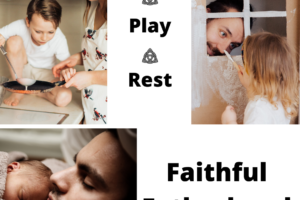Table of Contents
Seeking Solidarity
I was going to move on to play with passion this week, but I just couldn’t write about the importance of play, even though it is. Pain fills our news feeds. Riots, the language of the unheard, break out across the country. The President uses tears gas on citizens for a Bible and church photo op. It all just hurts my heart. I hurt for the family and friends of not only George Floyd, but Botham Jean, Breona Taylor, Ahmaud Aubrey, and too many others that deserve their own mention. If you have been personally affected by a story link it or tell it in the comments. As someone who has contributed to harming them in this country, in which I am so privileged, I am sorry. I am sorry for the grief, the pain, the suffering, and the dehumanizing lies I have told myself and others about you.

As I think about teaching with trust, I realize that one of the most important things about teaching is the work of solidarity. Solidarity is unity or agreement of feeling or action, especially among individuals with a common interest; mutual support within a group. For us, solidarity means that we must reach across to our students, join them, or invite them to join us. Regardless, solidarity is our work as teachers. In solidarity, we gain the most valuable currency, trust. Let me show you how it works in both ways.
Train Your Shadow
Maybe the most complicated method of creating solidarity is the invitation. Many of us understand how to invite people to learn in a classroom setting. Yet, there is a much deeper form of solidarity we can offer. We can invite people to be our shadows. The best example of this is the rabbinical practice used around the 1st century. The most widely read account of this practice is the ministry of Jesus.
Jesus invited 12 men to follow him everywhere. Many fail to acknowledge the fullness of Jesus’s humanity, yet imagine the solidarity built up with 12 students when they watch you eat, sleep, and even defecate for 3 years. In many cases of this teaching style, students would replicate diet, self-care, and professional patterns beyond the spiritual practices passed to them.
I want you to imagine how powerful it is to train a shadow. Share on XI do not suggest that we all drop everything and take 12 disciples underneath to live with us and follow us around full-time. I do want you to imagine how powerful it is to train a shadow. It takes effort, and you will fail. Jesus was deserted by all 12 on the night of his crucifixion, and Judas was the one who betrayed him. The movement created in the wake of that type of solidarity exists today, though. So I ask you, is the price of solidarity, even acknowledging your likelihood of failure, worth it? Jesus would have answered yes. Do you have the bravery to invite and train some shadows to teach at a deeper level?
Join them
While the first kind of solidarity asks the students to join us, the second invites us to dive into their world. This may seem the more comfortable and less permanent path. Still, this solidarity method will alter us, the teacher, far more than we may expect.
As we enter into this type of solidarity, we will be tempted to maintain a distance and a superiority that our position as a teacher affords us. However, this is not real solidarity. To be present with someone, we must walk in their shoes and see the world from their perspective. Joining our students affords us radically different views.
To be present with someone, we must walk in their shoes and see the world from their perspective. Share on XWhat Solidarity Costs
Real solidarity costs us something. It begins in humility. If you are going to train your shadow, you must expose your failings to your shadow. The students need to see the nitty-gritty ugly underside so they can see the logic in your decisions. To teach, you must become vulnerable to questions and criticism from your students. In fact, you might find them teaching you because they are the outside perspective. Have you the humility to take on that much exposure and vulnerability.
In joining our students, we give up our agency. Agency is the power to act. If we are to understand our students and so work in solidarity, we must experience through them as the observer without the freedom to operate or change outcomes. We must humble ourselves to our student’s directives.
The students need to see the nitty-gritty ugly underside so they can see the logic in your decisions. Share on XWorth the Risk?
Solidarity is a risky proposition. It almost always costs power and exposes our own weaknesses. So, why do it? Why risk vulnerability? There are many reasons that we can talk about what you gain back in power or understanding or abilities or perspective, but the most important one is connection.
Connecting with another being is perhaps the most worthy enterprise we can ever endeavor upon. When you understand someone for them, then you can love them. When you love someone else, you open yourself up to the possibility of love.
There is this quote from Ender’s Game that has always stuck with me. It exposes our desires for good, and our predisposition to hold on to power. The main character Ender says this of himself:
“In the moment when I truly understand my enemy, understand him well enough to defeat him, then in that very moment I also love him. I think it’s impossible to really understand somebody, what they want, what they believe, and not love them the way they love themselves.”
Why Am I Writing This?
I think it is hard to climb into the shoes of our opponents today. We have highlighted our differences for so long that we can’t see our commonalities that form bridges of solidarity. In our deep pain, we refuse to give up any power. We resist the risk of connection. The scary thing is that the relationship takes two. You cannot build a bridge without two sides. I look out at the world today, and I don’t see any bridges. I see ‘Never Trumpers’ and ‘Forever Trumpers.’ I see Black People and White People (and Red, Yellow, and Brown).
We separate ourselves for what? So the elites can hold on to power, and you can hope that some trickles down to you? No, you are afraid. You are scared of what living in someone else’s world will do to you. You are afraid of the changes that you will have to make as a result of loving the other side.
I dare you to live in courage. I dare myself to live in courage. We can and must be better. We must give up our power to create a connection. I write about solidarity to give myself the courage to step out of my house, living, loving, and learning with other people. For they deserve my respect and admiration because they too are alive.
Teach by earning trust. Then spend it to make you better by making your fellow person better. Share on X



